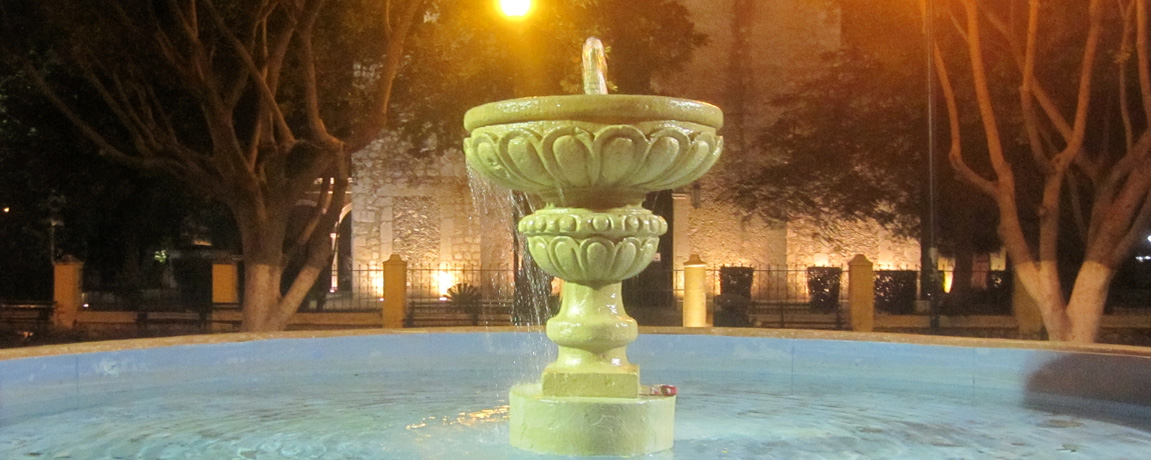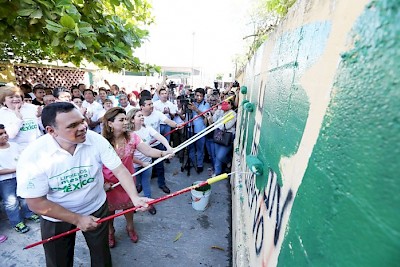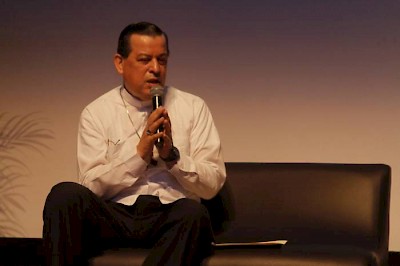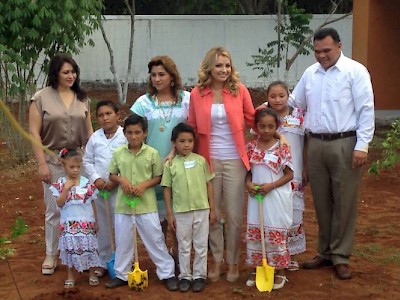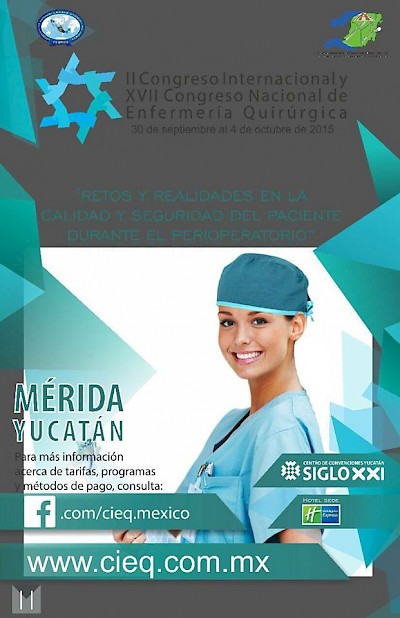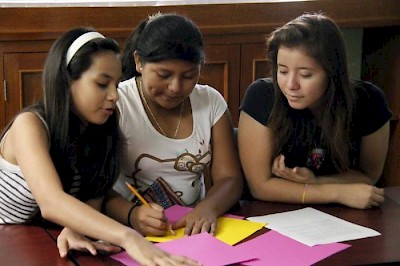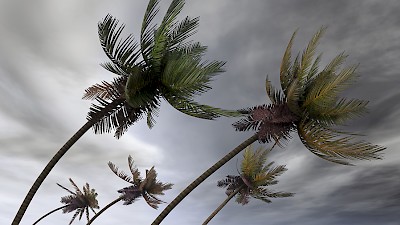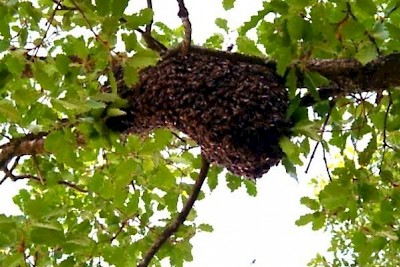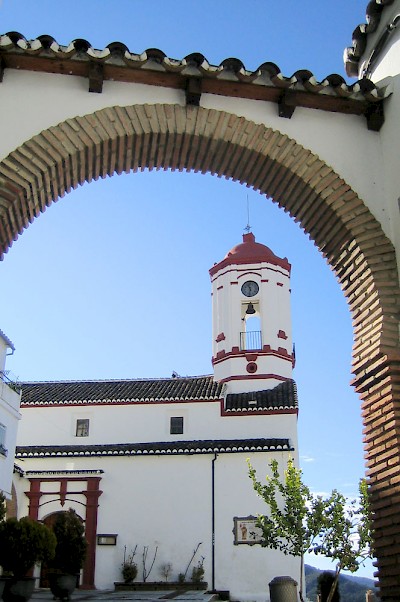Yucatan News: Bees and Baby Tigers
A Sight For Sore Eyes
This program is a long time coming... and if it works, it will take care of one of the worst problems in Yucatan. Mexico has called for a Garbage Clean Up program and Yucatan is joining in, according to an article in holayucatan.com. The photo shows participants, including Yucatan's Governor, Rolando Zapata, painting over grafitti, which in our mind is NOT the problem. But the article goes on to say that the program "seeks to clean up public spaces to collect trash, weeds and collect objects that can be recycled for the benefit of society." We can certainly get behind that initiative and hope that there will be a lot more about this program in the weeks and months to come. Apparently, this initiative is being presented and supported not only throughout Mexico, but also in Guatemala, Honduras and in other Central American countries. The article also says that "the director of TV Azteca Yucatan, Carlos Higuera Villanueva said this is the largest movement in the country of its kind, which sensitizes society to leave a better environment to the next generation." We lived in the USA when the program to clean up litter was initiated back in the Sixties (as we recall...). It took awhile for everyone to catch on, but it made a difference. Hopefully this program will make a big difference in Mexico and in Yucatan!
The Right Combination to Crime Prevention
It looks as if the State of Yucatan has tinkered with “what it takes to prevent crime” to the point of actually finding a combination of services that works! The agencies involved include: the State College of Professional Technical Education (Conalep), the National Center for Social Crime Prevention and Citizen Participation (Cepredey), and the Center for Youth Integration (ICJ). Together, these institutions provide students with not only the opportunity to get an excellent technical education, but also with workshops designed to reduce crime and addiction rates, and sports and academic competitions at which they excel on a national level, as well as the integration of culturally diverse students and staff. The result is a shocking crime rate of zero. Yes, that’s right. In recent years, students of Yucatan’s Conalep have not been involved in any criminal act and, it might also be noted, their rate of out-migration has also significantly decreased. This shows that state security, whether it is economic or cultural, is rooted in the hope it’s young people have in their ability to have a future at home. Yucatan’s support for its population of tomorrow has always been an outstanding cultural characteristic, but now it is proof-positive of the benefits of developing a future generation with access to hope for tomorrow.
Mexico’s First Lady Visits Primary School in Progreso
On Thursday afternoon, the First Lady of Mexico, Angelica Rivera, visited Felipe Carrillo Puerto Primary School in Progreso. One press report said that she came to verify that this primary school is living up to its Quality School and bilingual school reputation. That should bring a smile to anyone who has ever been involved with Felipe Carrillo Puerto Primary School in Progreso. This school has distinguished itself in every level of academics and social responsibility through the active participation of teachers, students, parents, the local community, and even the local expat community. The First Lady could not have chosen a better school to visit in order to find the origins of the spirit of Yucatan. We hope she enjoyed her trip and that she revisits Yucatan soon.
Merida: Conference of Surgical Nurses (September 30 – October 4)
On September 30, at the Siglo XXI Convention Center in Merida, 2,500 surgical nurses will meet in this professional event. It will be both the II International Conference of Surgical Nurses and the XVII National Conference of Surgical Nurses. The content of the event will include Legal and ethical aspects of the practice of health professionals, challenges of quality of care and patient safety in the perioperative environment, and Realities and innovations in quality of surgical practice. Although there is a Registration Fee for the conference, all workshops associated with this conference will then be at no charge to participants. As medical tourism increases, we see more and more people who seem only interested in the cost of medical services in Yucatan. This conference is an opportunity to see where these health care professionals stand within their own discipline. We are happy to report that Yucatan’s surgical nurses can, and do, function superbly on both a national and international stage. A sincere “welcome to Yucatan” and “your dedication is deeply appreciated” goes out to every participant in this conference.
Mathematics Workshop: Drawing With Mathematics
In Yucatan, there is a group of mathematically savvy students who participate in what is termed the Alpha Project. They are currently taking a short course, taught by physics engineer Jesus Castro Suaste. The course is called Drawing With Mathematics and includes problems in trigonometry and geometry, as a prelude to the calculus that will lead them into some of the most interesting (and well paying) careers in the world. These are special students, most of whom can already “see” the pictures of the figures that an equation will produce. For those who hit a little snag, there are tons of tips and tricks available to them. This workshop is where they will learn that mathematics is not as difficult as some would have one think. There are 15 high school and undergraduate students taking this workshop. We found it interesting that the photo released to the media is of three young ladies who are participants. That might not happen in countries where opportunities for girls are closed before they even begin their educations. Many thanks to Yucatan’s Ministry of Education for supporting not only this workshop, but also for supporting these young ladies as they stand at the beginning of their academic futures.
The Church and Organ Donation
One might think it odd that anyone is still debating organ donation in the 21st century, but such is the case in many areas of the world. There are some Christians who believe that the body, as a temple, should be respected and buried without organs being removed. The new Archbishop in Merida supports the writings of Yucatan’s beloved John Paul II, who begged to differ. He declared that there is no better way to engage in living charity than to improve the quality of life of another person through organ or tissue donation. Toward this end, Archbishop Gustavo Rodriguez has announced that the Church in Yucatan encourages the participation of all members in organ and/or tissue donation. It is refreshing to see a new Archbishop with the energy and courage to tackle one complex subject after another. So far, Archbishop Gustavo Rodriguez has a progressive attitude that will serve the members of Merida’s Catholic community quite well far into the future.
Tulum: First Annual Charity Golf Tournament
The Rotary Club of Tulum and the Tao Foundation will host their first Annual Charity Golf Tournament on Saturday October 31st, 2015 at Bahia Principe Golf Course. Proceeds from the event will benefit the Tulum Rotary Club and the Tao Foundation. The Tulum Rotary Club works in the communities of Tulum, Yaxche, Sahacab Mucuy, Macario Gomez and Francisco Uh May on diabetes testing, dental hygiene clinics, health care, education, environmental awareness programs and support of the Tulum Red Cross and Fire Company. The Tao Foundation works closely with Rotary and sponsors projects in children's health, special surgeries for children, education, and diabetes outreach information services and testing. The corporate sponsors for this year’s tournament are Acura Playa del Carmen, Agua Blanca, Coastal Homes, Greenwood Property Services, Hamburger Station, Honda Playa del Carmen, Hotel Gaia, Kanino Real, Los Arboles Tulum, Rosa del Viento, Tao Rentals, Toyota Playa del Carmen and Volvo. To register: email rotariostulum@outlook.com or call 984 100 597.
Naming Contest for Four Baby White Tigers
There is nothing more exciting for the children of Yucatan than an opportunity to name baby animals at the zoo. Now, there are four baby white tigers who all need a name, and the contest has begun. If you know of a child between the ages of three and twelve, who would like to participate in this contest, tell them that they can leave the names they have chosen (two males and 2 females) in the drop boxes installed at the Centenario Zoo or at Anymaya. They can also enter via the internet by sending a message to the AyuntaMerida on Facebook, via e-mail to ponlesnombre@merida.gob.mx, or on the website merida.gob.mx. They must include their name, address, e-mail address, and telephone number. This must be done by October 15, as the top five names for each baby will be put before the public for a vote between October 19 and 23. Winners will be announced on October 25, with awards given at that time. Photographs of the winners and the baby white tigers will be taken at that time. This is a great way to get the public involved and to help create the next generation of animal conservationists – a topic near and dear to the heart of all Yucatecos.
Weather: Possible Tropical Disturbance
For the time being, Yucatan is continuing to experience short bursts of torrential rain, with no formal tropical disturbances. However, it must be remembered that we are still in hurricane season and there is a storm in Honduras that has the potential to become a threat. The government has set aside plenty of disaster recovery funds, but that is of little help when the winds and rain are tearing a path across the peninsular. It doesn’t matter that there have been no major storms this summer. It only takes one to do significant and life-threatening damage and only a matter of hours for such a storm to form. Please be sure to keep all hurricane precautions intact until hurricane season ends November 30) and even beyond.
39th Annual National Solar Energy Week
This year, the conference associated with the National Solar Energy Week will be held in San Francisco, Campeche, October 5 through 9. It is one thing to talk about potential solar energy projects, but it is almost miraculous when we reach the point of those talks actually bearing fruit. Some of the plans ahead include solar energy projects that connect the larger consumers of energy in the region. These include governmental consumers, as well as hotels and other venues associated with tourism. If there was a solar network that includes all of those consumers, then the use of electricity throughout the peninsula would be significantly reduced. Solar energy has been found to be more practical, in this area, than wind power, while the reverse is true in the case of such states as Oaxaca. In either case, the time for talking is done and it is now time to begin putting these ideas into practice. Toward this end, at least 250 solar energy experts will participate in this conference and will have access to the technical papers of researchers, industrialists, technologists and other specialists.
Africanized Bees’ Behavioral Research
The Mexican Government has conducted a study of the behavior of Africanized bees and the results are in. The average rate of growth, nationally, for these insects is 36.1%, with Yucatan weighing in at 63.2%. Yet, Yucatan remains among the lowest 11 states for their attacks on humans. Findings also show that Africanized bees tend to become aggressive during periods of extremely high heat and drought, as do spiders and scorpions as well. During these periods, they look for places that are shady, cool, and have access to water. This often means that they build their hives near homes. However, Yucatan only registered one death from an attack by Africanized bees in the past year. It seems that there should be more, not fewer of these attacks; but, when one considers the efforts made to combat dengue and chikungunya fevers, the efforts at mosquito control made by the public, plus public education, have a great deal to do with how safe one is from not only mosquito borne diseases, but attacks from Africanized bees as well. There is little we can do about the heat, but the Clean Patios project has deprived many venomous insects of the water they need to live successfully among people. In addition, Yucatecos have heeded the warnings and immediately call the authorities for removal when Africanized bees are found. Please do keep up with Clean Patios and always call for help when Africanized bees are found.
Benjamin Ramirez Exhibition: Forty-Three Wounds
On 26th September 2014, forty-three young students of the Mexican town of Ayotzinapa disappeared during a protest. Over time, this incident has become one of the biggest political scandals concerning public safety that has been faced by the Mexican Presidncy. The massacre of these young students is a horrifying tragedy that is all too real. Benjamin Ramirez takes this opportunity to pay homage to the missing students by giving them back their stolen humanity using a human figure as a base, body, and support for their names. The underlying desire of the creator is that these young people are never forgotten and are remembered as human beings, and not just as a number. To this end, he took as a source of inspiration an anonymous 18th Century Mexican painting entitled The Five Wounds of Christ Our Redeemer. This exhibition is located in the Contemporary Art Museum of Genalguacil, Malaga in Spain.




